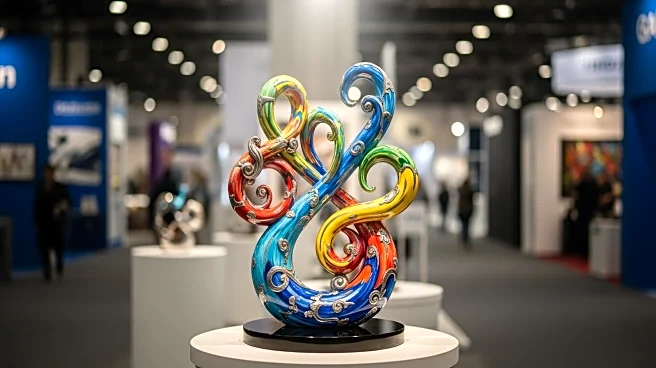What's Happening?
During Paris Fashion Week, trade shows such as Première Classe, Tranoï, and Man/Woman showcased a diverse array of fashion and accessories, despite ongoing geopolitical and economic challenges. Exhibitors and visitors faced uncertainty over trade tariffs and the difficulties experienced by high-end players. Alise Trautmane-Uzuner, CEO of Doors in New York, noted the challenges for independent fashion brands, yet highlighted the American market's interest in these brands. Stacey Pecor, owner of Olive + Bette’s, expressed concern over tariff uncertainties but remained focused on discovering new suppliers. The shows attracted 12,000 visitors, up from 9,500 the previous year, with 300 labels present, a third of which were newcomers. WSN CEO Frédéric Maus noted improved market sentiment and opportunities for innovative newcomers as luxury struggles and consumers boycott fast fashion.
Why It's Important?
The trade shows in Paris serve as a critical platform for emerging and independent fashion brands to gain exposure and connect with buyers, especially in a challenging economic climate. The increase in visitor numbers and the presence of new labels indicate a resilient interest in unique and creative fashion offerings. This trend could benefit U.S. retailers and consumers seeking diverse and innovative products. The focus on creativity and exclusivity may drive shifts in consumer preferences, potentially impacting the broader fashion industry by encouraging sustainable practices and reducing reliance on fast fashion. Retailers and brands that adapt to these changes may find new opportunities for growth and differentiation in a competitive market.
What's Next?
As the trade shows continue to evolve, exhibitors and buyers may explore new strategies to navigate economic uncertainties. The partnership between WSN and U.S.-based Shoppe Object for a European edition of the homewares show suggests a diversification of offerings. Retailers may increasingly seek experiential and unique products to attract consumers. The focus on emerging talent from regions like Indonesia and Africa could lead to greater international collaboration and innovation. Brands may also explore private-label opportunities to expand revenue streams, as seen with exhibitors like Namjosh and Ventura. These developments could influence future trade shows and the global fashion landscape.
Beyond the Headlines
The emphasis on creativity and exclusivity at the Paris trade shows highlights a potential shift in consumer values towards authenticity and craftsmanship. This trend may encourage brands to prioritize ethical and sustainable practices, impacting the fashion industry's long-term direction. The inclusion of wellness and beauty categories reflects a broader lifestyle approach, appealing to consumers seeking holistic experiences. The success of emerging designers from diverse backgrounds may inspire greater inclusivity and representation in fashion, fostering a more dynamic and culturally rich industry.









